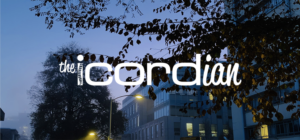

In this final issue of 2022, we’ll tell you about visits by three international scholars, expand on the importance of seed grants, congratulate researchers on grant successes, report on some trainee initiatives, and more, including our regular features. Special thanks to ICORD Social Media and Knowledge Translation assistant Jocelyn Chan, who wrote most of the features in this issue!
We hope you enjoy these stories:
- International scientists visit ICORD
- Seed grants nurture ideas
- Researchers recognized for collaborative projects
- ICORD Trainee Committee sets student up for success
- ICORD PI wins top CIHR grant award
- Trainee symposium success
And these regular features:
International scientists visit ICORD
by Jocelyn Chan
Visitors from Denmark, the United States, and Germany came to ICORD to collaborate with ICORD researchers this fall. Dr. Ben Mortenson hosted Dr. Tina Helle and Stina Bjørnskov from VIA University College in Aarhus, Denmark, as well as Dr. Reuben Escorpizo from the University of Vermont, and Dr. Corree Laule hosted Dr. Hagen Kitzler from the Technische Universität Dresden and Dresden University Hospital in Dresden, Germany.
Like Dr. Mortenson, Tina Helle and Stina Bjørnskov focus their research on assistive technology and environmental accessibility. During their stay, the researchers discussed a project they are currently planning and the possibility of doing a similar study in Canada. “They visited researchers at the Rehabilitation Research Program at GF Strong and we also did a knowledge exchange with trainees from my lab and Dr. Miller’s lab at UBC,” said Dr. Mortenson.“I took them on a tour of Vancouver on their first day in town, and had them over to my house for dinner. They loved experiencing Canadian Hallowe’en,” Dr. Mortenson added.

Tina (left) & Stina (right) enjoy the view from Queen Elizabeth Park
Reuben Escorpizo is a clinical associate professor, and Associate Director of the Department of Rehabilitation and Movement Science at the University of Vermont. His work is focused on the international classification of functioning, disability and health, with a focus on pain and employment, especially among people with SCI. “Reuben has had a long association with SCIRE and was one of the original authors and had worked with my colleague Dr. Bill Miller. His focus on employment related outcomes is a good fit with my disability focused research in this population,” explained Dr. Mortenson.
Drs. Mortenson and Escorpizo are currently working on a scoping review together and will be applying for WorkSafeBC funding to do a study related to improving employment outcomes among people with SCI. Besides research endeavours during his visit, Dr. Escorpizo has also had a chance to explore the natural beauty of Vancouver. “At this point I have taken him for a tour of Granville Island and will be taking him either skiing or exploring Vancouver on the weekend,” said Dr. Mortenson.

Rueben (left) and Ben (right) on a walk around the False Creek seawall
Hagen Kitzler is the medical director for clinical trials at the Institute of Neuroradiology MRI research unit, and he is currently focusing on harmonized MRI strategies and translational research integrating MRI advances and automated quantification into clinical MS brain and spinal cord imaging. While visiting Vancouver, Dr. Kitzler worked with Dr. Laule on a number of collaborative MRI efforts including harmonization of a spinal cord imaging protocol and advanced MRI approaches for detecting diffuse damage in the brain and spinal cord. “Hagen’s trip was delayed twice due to pandemic travel restrictions, but his visit was worth the wait! I’m so glad he finally made it so we had the chance to work on establishing a number of collaborations focused on in vivo quantitative spinal cord MRI and ex vivo MRI-histology correlation studies with the International Spinal Cord Injury Biobank,” said Dr. Laule.
Dr. Mortenson and Dr. Laule have plans for future research, trainee supervision and grant submissions with their visiting scholars. Dr. Mortenson plans to visit Dr. Helle and Stina in May 2023 as part of a visiting scholar trip to several Scandinavian universities. Dr. Laule, her students and UBC MRI colleagues are planning to visit Dr. Kitzler in Fall 2023 for a joint symposium and working group meeting.
The visits of Drs. Escorpizo and Kitzler were made possible through ICORD’s Visiting Scholar program. This program supports travel and living expenses for distinguished international scholars through generous funding provided by the Rick Hansen Foundation. “It has been wonderful having funds to host Reuben. It  has provided us an opportunity to collaborate much more closely than would have been possible using video conferencing platforms,” said Dr. Mortenson. “It’s so valuable for our trainees to have the chance to connect with international scholars in person. It gives them a different perspective on their work, and they make connections that can lead to future collaborations and even career opportunities,” said Dr. Laule.
has provided us an opportunity to collaborate much more closely than would have been possible using video conferencing platforms,” said Dr. Mortenson. “It’s so valuable for our trainees to have the chance to connect with international scholars in person. It gives them a different perspective on their work, and they make connections that can lead to future collaborations and even career opportunities,” said Dr. Laule.
Seed grants nurture ideas
Have you ever wondered how a small idea in a scientist’s mind becomes a funded research project? The answer is pretty complicated, as you probably imagined.
We made this flow chart to illustrate the process (click here for full-size version):
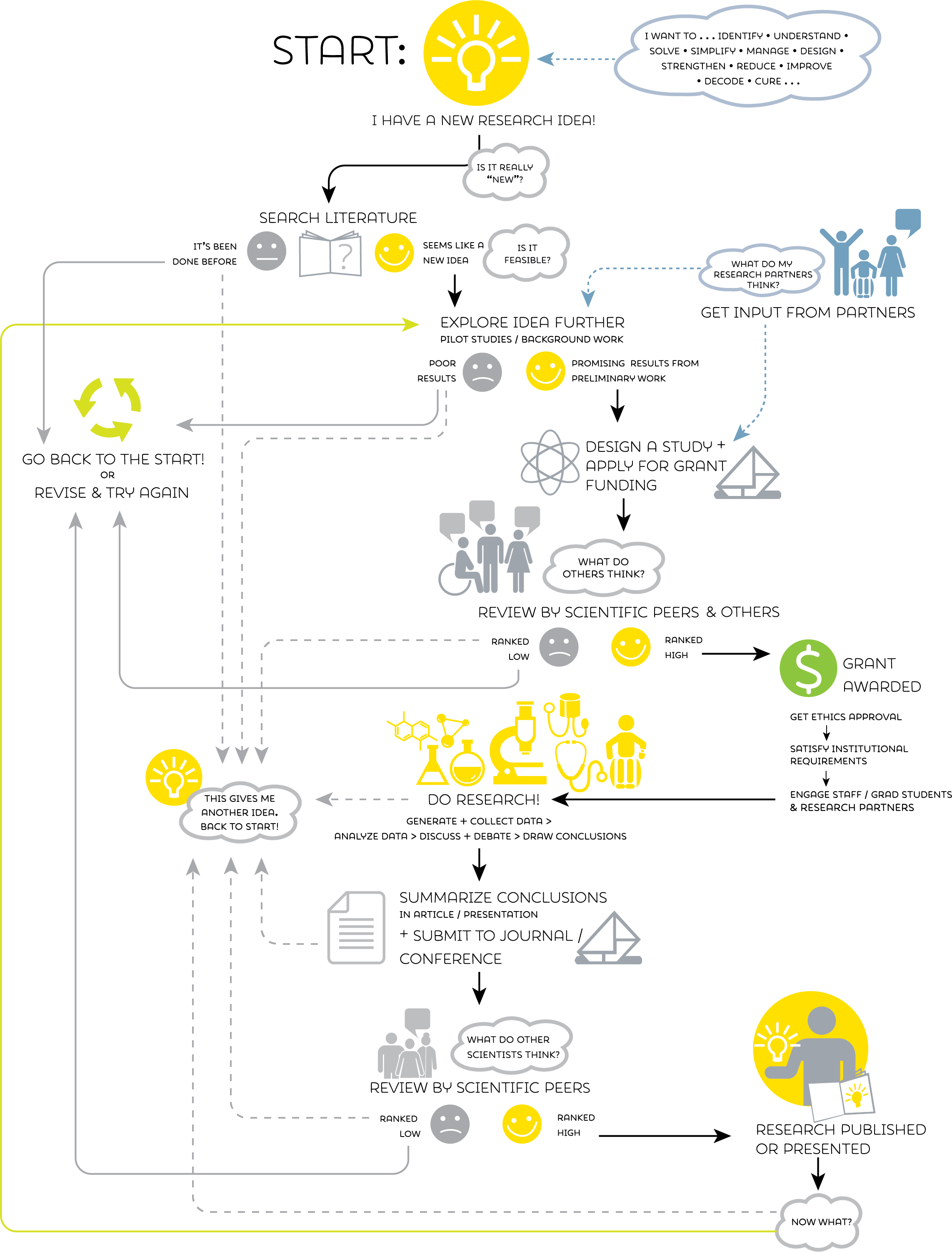
See where it says “Explore idea further”?
This is the part of the process in which having some funding to do small experiments and generate pilot data is really important. Researchers can use the results of small pilot studies to strengthen applications to larger grant competitions. Or, pilot studies can reveal that their ideas need more work before they can be put forward for competitive research funding.
Since 2013, ICORD researchers have been fortunate to have access to Seed Grants, funded by the Rick Hansen Foundation. These small grants of up to $20,000 enabled ICORD faculty members to generate pilot data for future applications for larger multi-year operating grants. 90 seed grants have been awarded (with the Fall 2022 funding competition currently being adjudicated). More than half of those pilot projects showed promising results, so the researchers were able to apply for competitive grant funding from large funding agencies. $1.6M in Seed Grants grew into $32.8M in competitively-funded research grants.
One example of the value of Seed Grants is the success of Drs. Brian Kwon, Chris West, and Babak Shadgan with funding from the United States Defense Advanced Research Project Agency (DARPA). They co-led an international research team which received a US$36.5M grant last year (of which US$9M will come to ICORD) for research that aims to revolutionize SCI treatments using innovative, implantable technologies. The five-year project started as a seed grant in 2015. [you can read more about this project in our Winter 2022 issue]
Another valuable side-effect of seed grants is that they catalyze collaboration between researchers in very different disciplines who might not otherwise have funding for unusual joint projects (for example, between professors of urology and kinesiology, or physiatry and ophthalmology).
ICORD researchers are extremely appreciative of the funding provided by RHF for seed grants. Do you want to read more about the research process in a future issue of the ICORDian? Let us know!
Researchers recognized for collaborative projects
ICORD PIs Dr. Heather Gainforth and Dr. Carolyn Sparrey have both received Convening & Collaborating (C2) awards from Michael Smith Health Research BC.
Dr. Sparrey, director of the SFU Neurospine Lab and scientific director of SFU’s ImageTech Lab, received a C2 award for her project “Co-creating a research agenda for health technology innovations.” Although there are many up and coming health technologies, it is unclear how to best fit technology into our healthcare system and through a series of workshops, her research team hopes to glean some insight. “We’re hoping to connect with people interested in health technology innovation in BC from patients and families to industry leaders and policy makers. We know there are lots of great technologies and technology concepts that could impact healthcare but we need to bring teams together to address all the steps required to translate these technologies into equitable and accessible patient care. With the official launch of SFU’s new medical school, we see this as an opportunity to intersect health technology development and physician training to ensure the range of emerging technologies are effectively leveraged to help patients,” said Dr. Sparrey. Those interested in joining the conversation are welcome to contact Dr. Sparrey.
Dr. Gainforth’s project is “A partnership approach to co-developing a smoking cessation intervention for persons with spinal cord injury.” Compared to the general population, people with SCI report higher cigarette smoking rates, poorer health outcomes related to smoking, and lower engagement with smoking cessation treatments. Despite these inequities, SCI-specific smoking cessation supports have not yet been developed to help people with SCI stop smoking. “Efforts to support smoking cessation among people with disabilities is an important and lifesaving need that has been overlooked in research for too long”, said Dr. Gainforth. In partnership with SCI BC, this project aims to convene a panel of researchers and research users to co-develop a smoking cessation intervention for people with SCI and the protocol for evaluating the intervention. “The work is applying the IKT Guiding Principles and is being co-led by my Applied Behaviour Change Lab, ICORD trainee Kelsey Wuerstl, and Spinal Cord Injury BC. Several ICORD PIs are being engaged to co-design the intervention and evaluation alongside people with lived experience of SCI, behavioural scientists, physiologists, clinicians, and smoking cessation experts,” explained Dr. Gainforth.
ICORD Trainee Committee sets up students for success
by Jocelyn Chan
Since the ICORD Trainee Committee (ITC) was established in 2010, this group of dedicated students has given their time to organize social activities, research events and workshops, and community outreach for not only trainees but also the ICORD community as a whole. Although members have changed over the years, their commitment to volunteering their time to ICORD has remained the same. In this issue, we introduce this year’s committee team, as well as two members of past committees who have helped shape the ITC into what it is today – Dr. Diana Hunter, and Dr. Raza Malik.
The 2022-23 committee is co-chaired by Nicole Bailey of Dr. John Kramer’s lab and Adam Doelman of Dr. Brian Kwon’s lab. Nicole is returning for her second year as co-chair and Adam will be serving his fourth year on the ITC (we introduced Nicole and Adam in the Fall 2021 ICORDian). Social Coordinators Himali Bergeron-Vitez and Cassandra Choles (both from the Kramer Lab) successfully executed their first trainee social, a hugely succesful Trivia Night filled with friendly competition and prizes!

Members of the Trainee Committee at Trivia Night (L-R) Cesar Jimenez-Gonzalez, Himali Bergeron-Vitez, Cassandra Choles, Aysha Allard Brown, Amir Borjali, Adan Moallemi, Nicole Bailey. Missing: Adam Doelman, Felicia Kangkoyiri, Xueqing Zhou, Sabiha Sultana
Cesar Jimenez-Gonzalez (Sparrey Lab) and Amir Borjali (Kwon/Cripton Lab) will support ICORD trainees by organizing various workshops including grant applications, how to give a presentation, EDI (equity, diversity, and inclusion) and more. This year’s ITC also aims to bring seminars back in-person for 2023 with a hybrid virtual option. Seminar coordinator Adan Moallemi (Shahriari/Tetzlaff Lab) finds trainees from ICORD labs to present monthly seminars about their research. Felicia Kangkoyiri (Mortenson Lab) will be organizing the 2023 Trainee Symposium, and Sabiha Sultana (OIBG) and Aysha Allard Brown (Kwon Lab) run the ITC’s social media platforms and keep records of meetings and events.
Members of the ITC have an important role in the social and research culture at ICORD, but membership is also important to the trainees who take on executive roles. Transferable skills like communication, time management, organization, and negotiation are all extremely valuable – strengthening CVs and giving former members an advantage when applying for future academic or career positions.
Drs. Diana Hunter and Raza Malik can attest to the value of ITC membership. Now both pursuing postdoctoral fellowships, they each spent multiple years as ITC executive members while completing their PhDs at ICORD.
Dr. Diana Hunter (shown, left, with her daughter Ada) is a postdoctoral fellow studying mutations of potassium channels of induced pluripotent 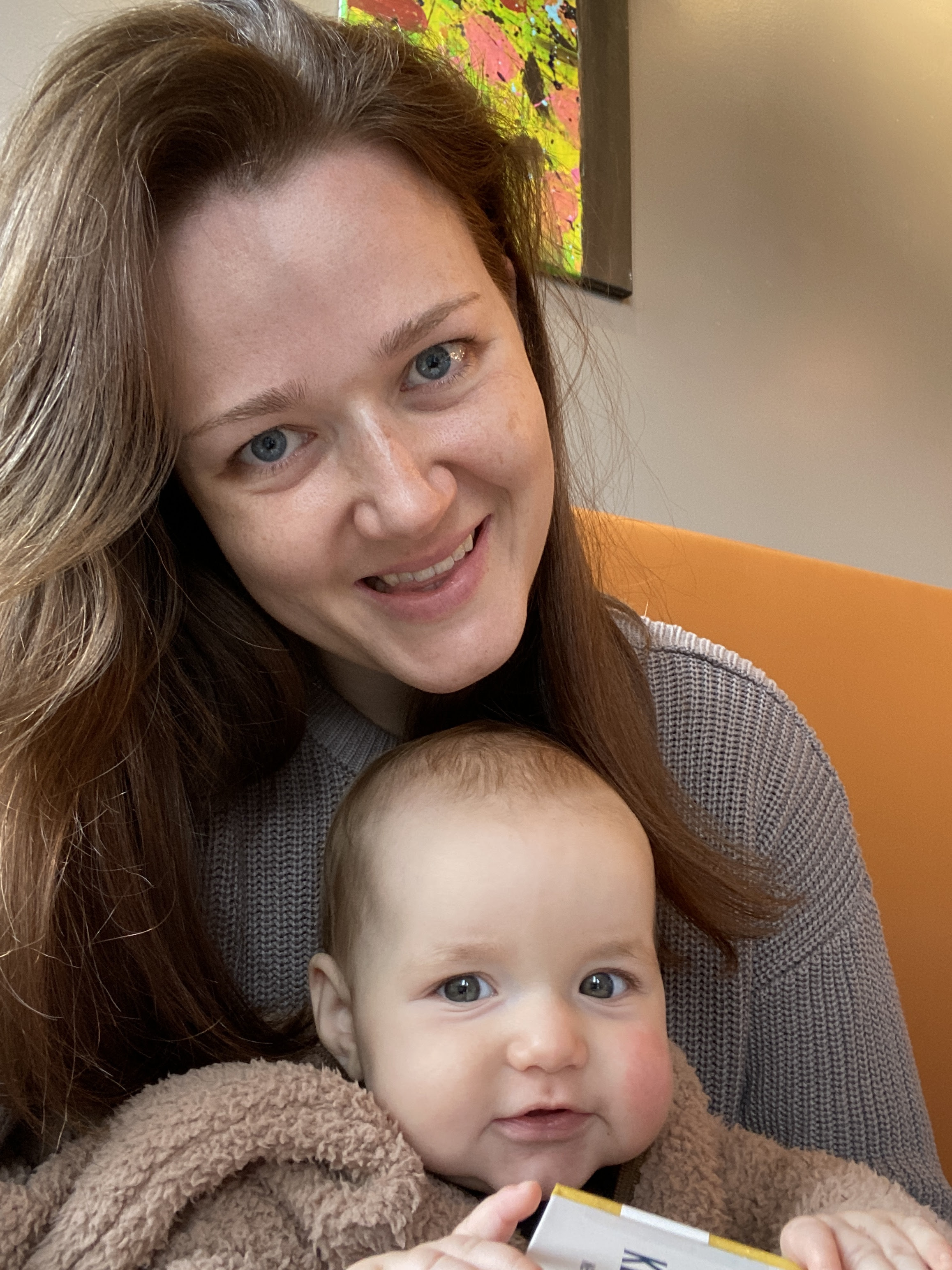 stem cells in Dr. Tom Claydon’s lab at SFU. She held many roles on the ITC during her PhD training in Dr. Matt Ramer’s lab including acting as the treasurer, chair, and trainee representative on the ICORD executive. She believes her time on the ITC inspired her interest in advocacy.
stem cells in Dr. Tom Claydon’s lab at SFU. She held many roles on the ITC during her PhD training in Dr. Matt Ramer’s lab including acting as the treasurer, chair, and trainee representative on the ICORD executive. She believes her time on the ITC inspired her interest in advocacy.
“I now am a member of the SFU Postdoctoral Association Executive and I deal with a number of the same things with a new group of trainees. I get to regularly interact with people in the university administration including the Dean of Graduate and Postdoctoral Studies and the Vice President Research International. It also allowed me to have support from outside my lab, from the ICORD administration and director, that ended up being critical for my success and have helped me (with reference letters and the like) get support in my postdoctoral work,” said Dr. Hunter.
She looks back on her time in the ITC fondly. “I have many great memories, especially the trainee symposia when we hosted international guests and really got a chance to practice event planning and trying out new ways to communicate our science. I remember the graphic abstract competition being a big hit!” she recalled. Now as a postdoc, she studies how gene variants impact the channels’ and cells’ function. “In addition to all that I have also had two daughters since I graduated with my PhD – Lucy is almost four and Ada is just over one. My science and my kids certainly keep me busy!” said Dr. Hunter.
Dr. Raza Malik spent six years on the ITC while completing his PhD in Dr. Tania Lam’s lab (2013-2019). He was Social Coordinator, and 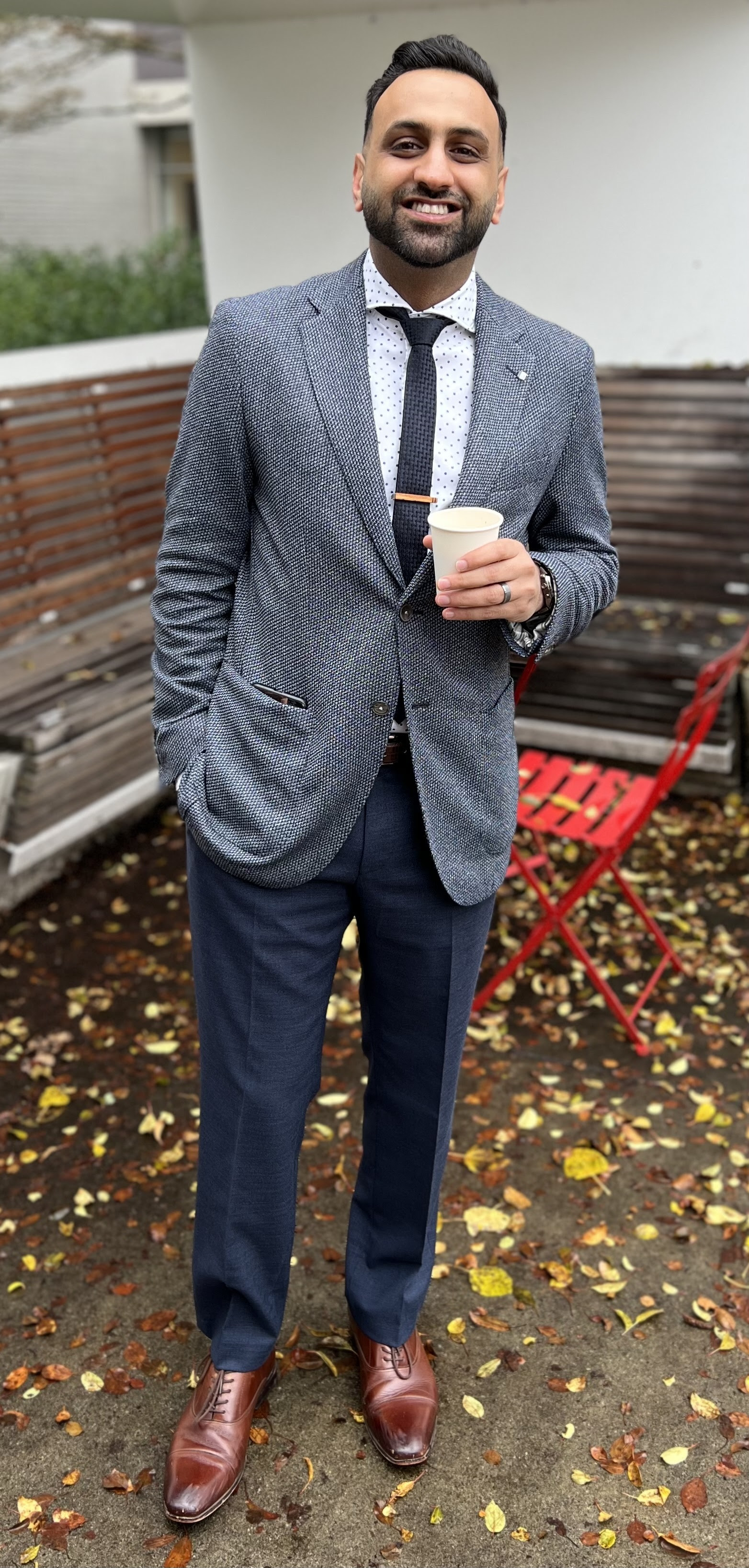 also co-organizer (and MC) of the Trainee Symposium. He was also the host for two fundraising galas at ICORD (2015 and 2016). “Being a part of the trainee committee helps you build connections with trainees, admin, and PIs at ICORD. It also exposes you to opportunities you may not otherwise have, such as organizing symposia, and getting to meet prominent scientists in the field. I was able to have dinner with Dr. Reggie Edgerton and Dr. Mary Bartlett Bunge!”
also co-organizer (and MC) of the Trainee Symposium. He was also the host for two fundraising galas at ICORD (2015 and 2016). “Being a part of the trainee committee helps you build connections with trainees, admin, and PIs at ICORD. It also exposes you to opportunities you may not otherwise have, such as organizing symposia, and getting to meet prominent scientists in the field. I was able to have dinner with Dr. Reggie Edgerton and Dr. Mary Bartlett Bunge!”
Dr. Malik is now a postdoctoral research fellow working with Dr. Andrei Krassioukov investigating the effects of transcutaneous and epidural spinal cord stimulation on autonomic function (i.e., bowel, bladder, sexual and cardiovascular health) in people with SCI. He feels his time on the ITC helped shape his career into what it is today. “My time on the ITC provided a great trainee environment which was a big part of my graduate student experience. Through my involvement in the ITC, I was able to host many events at ICORD. Being the only ICORD trainee to emcee the Spinal Chord Galas was a very memorable experience for me. These events were attended by many PIs,  university representatives and community stakeholders, which helped me network and enhance my profile in the SCI community,” he said.
university representatives and community stakeholders, which helped me network and enhance my profile in the SCI community,” he said.
Among the many events Dr. Malik helped organize and host, the annual ICORD Trainee Symposia stands out as a favourite memory. “For a few years, we got local specialty coffee shops to sponsor the event, and we ran trivia between talks to give away prizes. These were fun events that got great feedback,” he reflected.
The ICORD Trainee Committee is grateful to the Rick Hansen  Foundation for supporting many activities including the annual symposium and monthly seminars. If you have ideas for trainee events or other suggestions for the ITC, Nicole or Adam would be happy to hear from you.
Foundation for supporting many activities including the annual symposium and monthly seminars. If you have ideas for trainee events or other suggestions for the ITC, Nicole or Adam would be happy to hear from you.
ICORD PI wins top CIHR grant award
by Jocelyn Chan
Dr. David Granville’s research laboratory focuses on evaluating novel therapeutic targets for aging-related, autoimmune and/or chronic inflammatory diseases and developing clinical solutions. One of their target concerns is itch. Itch (also known as pruritus) is a debilitating symptom that is disproportionately experienced by the elderly. Itchiness of the skin afflicts 40% of the aging population and can have a severe impact on quality of life. Currently, many of the therapeutic interventions for itch are not suitable for the elderly due to adverse effects, pointing to an urgent medical need.
Based on promising data implicating Granzyme B as a key mediator in aging-related itch, the Granville Laboratory submitted a research proposal entitled Novel mechanisms and therapeutic approach for aging-related pruritus to the CIHR Spring 2022 Project Grant competition, and was successful in obtaining $872,000 over 5 years. They also received the prestigious Award of Excellence in Research in Aging from the CIHR Institute of Aging. This $50,000 award is given to the highest-ranked application that aligns with the mandate of the Institute. Huge congratulations to the Granville Lab!
“We are thrilled the reviewers recognized the importance of this work and honoured that they ranked our proposal first in the Biological and Clinical Aspects of Aging panel of 50 grants. We are also immensely grateful to be the recipient of the Award of Excellence in Research in Aging from the CIHR Institute of Aging,” said Dr. Karen Jung, a biomedical writer in the Granville Lab. Dr. Granville also commented on his hopes moving forwards – “We are honoured and highly grateful to be recognized in this way by the CIHR Institute of Aging. We have been working in this area for a long time and are optimistic regarding the impact this therapeutic approach could have on a number of age-related, chronic skin pathologies. The funding provided by CIHR will enable us to move closer towards achieving this goal”.
So, what are granzymes? Granzymes are a family of proteases (proteins that cut other proteins) that play key roles in our immune system. Granzyme B is not typically detected in healthy skin but found at high levels in aging and/or inflamed skin. Over the past decade, the Granville Lab have identified key roles for Granzyme B in a number of aging-related and/or autoimmune, chronic inflammatory skin conditions. “When looking back at our previous work, a common feature that we observed for many of the conditions studied was the reduction of itch when we inhibited Granzyme B. As such, we decided to explore if this deleterious protease could be directly triggering itchiness in the skin,” explained Dr. Granvile. [Read more about this research in this 2020 VCHRI Research Insider article]
With the Granville Lab’s multi-disciplinary team, including co-applicants Dr. Philipp Lange (UBC, BC Children’s Hospital Research Institute), Dr. Matt Ramer (ICORD), and Dr. Layla Nabai (Granville Lab Postdoctoral Fellow), the research team comprehensively investigate the relationship between Granzyme B and itch. They aim to translate this work into practice through the use of a topical drug that they developed with a local UBC-spinoff company, viDA Therapeutics.
Ultimately, the Granville team hopes that findings from these studies will advance the understanding of Granzyme B in aging-related itch and further the development of Granzyme B-targeting drug towards clinical approval and improving patient outcomes.

The Granville Lab in May 2022
Trainee Symposium success
On October 18, ICORD Trainees hosting their annual symposium. The hybrid in-person/virtual event was a great success with over 96 registered participants! The event featured trainee seminars, a keynote seminar by Dr. Michele Basso visiting from Ohio State University, and seminars by ICORD faculty Dr. Stephanie Willerth and Dr. Peter Cripton.
Dr. Basso’s keynote presentation was on myelin, neuroinflammation and rehabilitation in SCI. Matthew Rodreick, U2FP Executive Director and Nancy Nicholas, SCI Community Liaison, held a moderated discussion on lived experience and research. Dr. Stephanie Willerth spoke about 3-D bioprinting human tissue models, and Dr. Peter Cripton gave a talk on injury prevention.
 Following the trainee talks and data blitz session, participants enjoyed a lively poster session with 30 trainee and staff posters, as well as six resource tables set up by Graduate Student Services, ASDa, ICORD Trainee Committee, Data Binge, Indigenous Student Summer Program, ICORD research liaison, and REACH BC. The Trainee Symposium is generously supported by the Rick Hansen Foundation.
Following the trainee talks and data blitz session, participants enjoyed a lively poster session with 30 trainee and staff posters, as well as six resource tables set up by Graduate Student Services, ASDa, ICORD Trainee Committee, Data Binge, Indigenous Student Summer Program, ICORD research liaison, and REACH BC. The Trainee Symposium is generously supported by the Rick Hansen Foundation.

Symposium poster and presentation prize winners
Art under the microscope:
axonal canopies
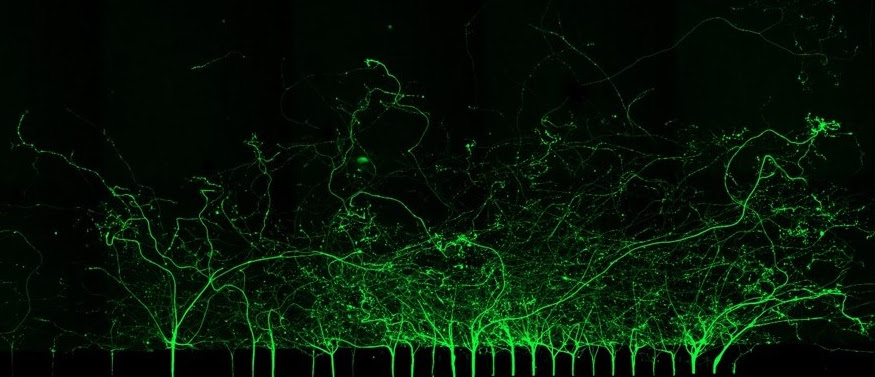
Dr. Oscar Seira of the Tetzlaff Lab shared these images from a pilot study, showing axons growing through “super thin micro-channels, and exiting and growing in an open chamber.” He calls them “axonal canopies” and they really do look like a wild forest!
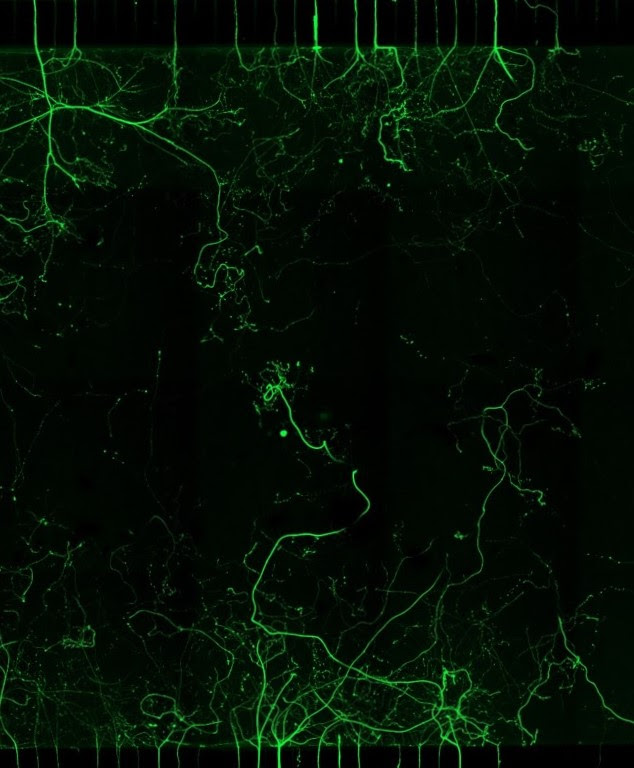
 The EPIC-SCI Trial is still recruiting!
The EPIC-SCI Trial is still recruiting!
Dr. Kathleen Martin Ginis’s lab at ICORD-O, in collaboration with members of Chris West’s and John Kramer’s labs in Vancouver, is conducting a study on the effects of exercise on health and well-being among adults with spinal cord injury who live with chronic pain. The EPIC-SCI trial takes place in both Okanagan and Vancouver and is a great example of a collaborative project across of ICORD settings. Click here for more information about the trial.
ICORD-O is leading a
collaborative SCI smoking cessation project
Efforts to support smoking cessation among people with disabilities is an important and lifesaving need that has been overlooked in research for too long. Using the IKT Guiding Principles, several ICORD PIs (Heather Gainforth, Kathleen Martin Ginis, Rhonda Willms, Chris West) are working together to co-design a smoking cessation intervention alongside people with lived experience of SCI, behavioural scientists, physiologists, clinicians, and smoking cessation experts. On November 7, we hosted our first of three meetings at UBC Okanagan as the first step to visioning a smoking cessation intervention for persons with SCI.
Help us do research
Interested in helping ICORD researchers make SCI preventable, livable, and curable? These research studies (and more) are in need of participants!
Impact of spinal cord injury on cardiorespiratory interactions
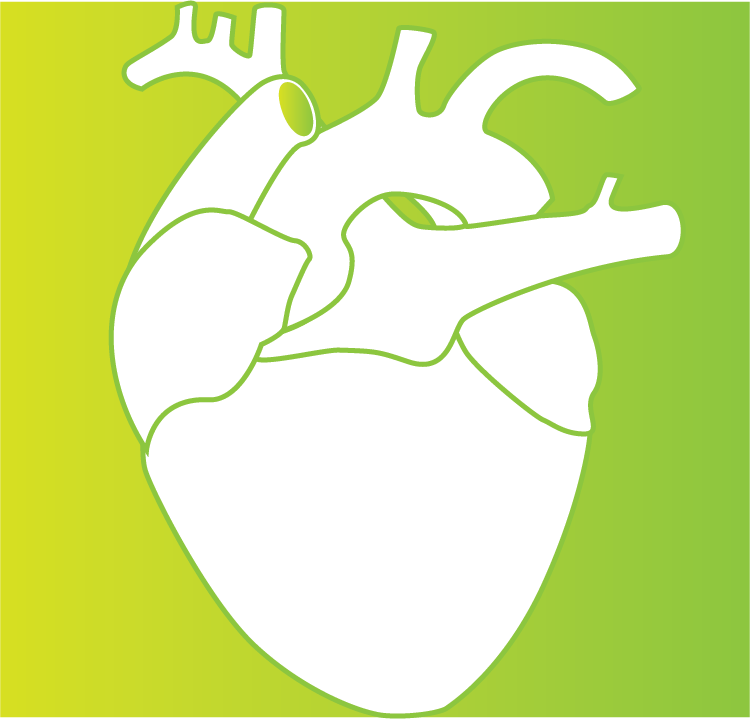 ICORD researcher Dr. Claydon and her research team at SFU are interested in studying how spinal cord injury (SCI) may impact the relationship between breathing and cardiovascular function, and to characterize the interactions between breathing-related cardiovascular regulation and obstructive sleep apnoea (a sleep disordered breathing condition).
ICORD researcher Dr. Claydon and her research team at SFU are interested in studying how spinal cord injury (SCI) may impact the relationship between breathing and cardiovascular function, and to characterize the interactions between breathing-related cardiovascular regulation and obstructive sleep apnoea (a sleep disordered breathing condition).
Does exercise at home or a gym offer better outcomes for people with SCI?
![]() Since adaptive cardiovascular equipment is typically not available, ICORD researchers have created a relatively inexpensive rowing machine (aROW) that can be set up in a home or local gym. They want to know what setting is the best place for individuals with a SCI/D to have access: at home or in a gym? In a home the exercise equipment might be close at hand with little need to travel to a gym,but some might like the social aspect of others to exercise with. This study will explore, to a limited capacity, the impact of both. Participants will receive a modified rower to use at home for two months and then a pass at a gym that has a modified rower for two months. You will be required to complete online questionnaires and three online interviews (2.5 hours total).
Since adaptive cardiovascular equipment is typically not available, ICORD researchers have created a relatively inexpensive rowing machine (aROW) that can be set up in a home or local gym. They want to know what setting is the best place for individuals with a SCI/D to have access: at home or in a gym? In a home the exercise equipment might be close at hand with little need to travel to a gym,but some might like the social aspect of others to exercise with. This study will explore, to a limited capacity, the impact of both. Participants will receive a modified rower to use at home for two months and then a pass at a gym that has a modified rower for two months. You will be required to complete online questionnaires and three online interviews (2.5 hours total).
Barriers & Facilitators to Bowel Care Management After Spinal Cord Injury

Researchers in the Claydon lab are inviting you to participate in a phone interview about making changes to bowel care after SCI. They are currently recruiting medical professionals to discuss bowel care routines and what makes changing them difficult. The purpose of this study is to investigate what helps and what hinders individuals in deciding to make changes to their bowel care routines. Participants will fill out an online screening tool that will determine eligibility followed by talking with one of the researchers about their thoughts on bowel care.
Sex differences in cardiac function in individuals high-level SCI
 Drs. Chris West and Alex Williams are investigating whether there are differences between the male and female heart in individuals with spinal cord injuries (SCI) between the C4 and T6 levels, in comparison to any sex-related differences that exist in uninjured individuals. They want to know whether these sex-related differences in the heart exist at rest, and also when your posture changes.
Drs. Chris West and Alex Williams are investigating whether there are differences between the male and female heart in individuals with spinal cord injuries (SCI) between the C4 and T6 levels, in comparison to any sex-related differences that exist in uninjured individuals. They want to know whether these sex-related differences in the heart exist at rest, and also when your posture changes.
Click here to browse all the ICORD studies currently recruiting participants.
Partner news
Save the Date for the #APN2023 Conference
The Rick Hansen Foundation’s Accessibility Professional Network (APN) Conference will return on March 1 and 2, 2023.
#APN2023: Building Together will bring together industry leaders, accessibility professionals, and global thought-leaders to discuss how we can continue building an inclusive and accessible world for people of all ages and abilities. #APN2023 will be held in Vancouver, BC, with hybrid options for online and in-person attendance. Speakers and registration information will be released in January 2023.
 Interesting articles
Interesting articles
VCHRI published a story featuring ICORD PI, Dr. Lyndia Wu, and her work on machine learning and head injuries in sport. Read the story here.
They also released a story with PIs Dr. Andrea Bundon and Dr. Andrei Krassioukov about TeleSCI services for the SCI community. Read the article here and learn more about health services delivered via telecommunications.
 First Indigenous SCI Gathering
First Indigenous SCI Gathering
Praxis and Indigenous Peoples’ Liaison, Richard Peter, held the first Indigenous SCI Gathering on Friday November 4, 2022. The gathering took place at the offices of Spinal Cord Injury BC and provided a space for peers with SCI and other mobility issues to share and raise awareness on their experience as Indigenous people with a disability. Read more here.
RHSCIR Report 2020
The RHSCIR Network Report 2020 (published 2022) is a detailed look at clinical and demographic data collected from 751 (611 traumatic SCI; 140 non-traumatic SCI) new RHSCIR participants in 2020. Read it here.
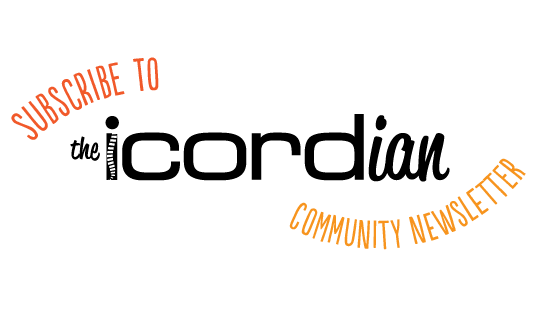 Thanks for reading this issue of The ICORDian – we hope you enjoyed it! Please subscribe and have future issues delivered to your inbox. If you have any comments about this issue or suggestions for future ones, please contact us.
Thanks for reading this issue of The ICORDian – we hope you enjoyed it! Please subscribe and have future issues delivered to your inbox. If you have any comments about this issue or suggestions for future ones, please contact us.
|
Jocelyn Chan, Femke Hoekstra, Diana Hunter, Raza Malik, Ben Mortenson, Katie Ashwell, Oscar Seira, and Karen Jung for their contributions to this issue of our newsletter.
|




